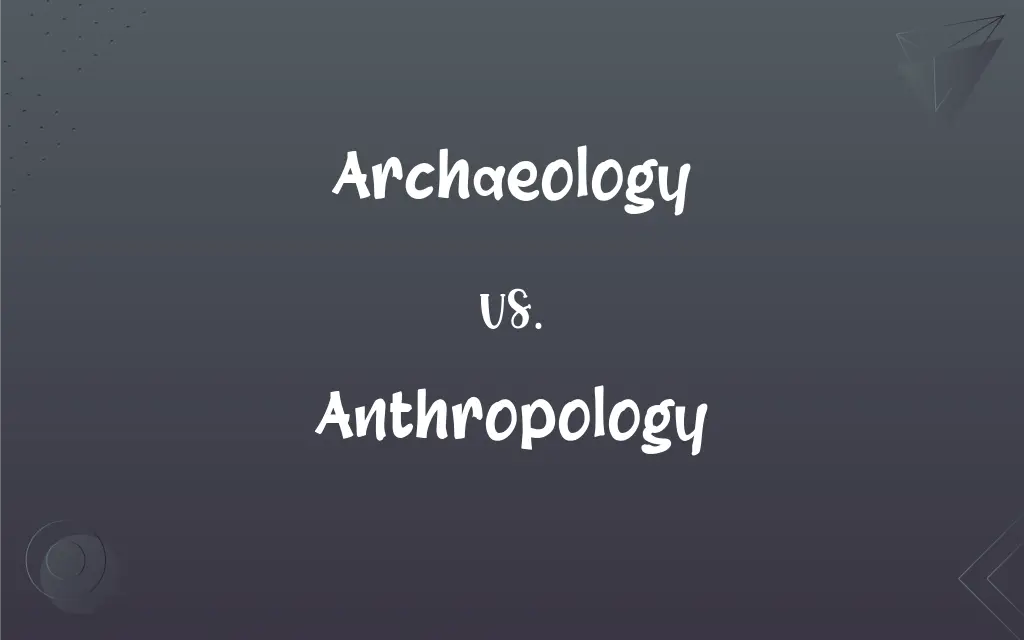Archaeology vs. Anthropology: What's the Difference?
Edited by Janet White || By Harlon Moss || Updated on October 13, 2023
Archaeology explores human history through excavation of artifacts and structures. Anthropology studies human societies, cultures, and their development.

Key Differences
Archaeology is a subfield of anthropology, dedicated to unearthing past human activities through the examination of artifacts, structures, and other physical remains. Anthropology encompasses a broader study, examining various aspects of humans within past and present societies. In essence, archaeology excavates the material culture of the past, while anthropology delves into both tangible and intangible elements of human societies.
Anthropology, in its holistic study of humanity, has various branches such as cultural, biological, linguistic anthropology, and archaeology. Archaeology can, therefore, be seen as a specialized branch of anthropology, focusing primarily on the tangible artifacts of past societies. While anthropology seeks to understand the full spectrum of human experience, archaeology provides a temporal perspective, revealing how societies have transformed over time.
Archaeologists engage in meticulous digs, often seeking objects or structures that offer insight into the daily lives, practices, and transitions of ancient societies. Anthropologists, on the other hand, might consider a broader range of data, from folklore, language, rituals, and even the physical evolution of humans, to comprehend our species and its cultures. Both fields, though distinct, provide essential insights into the understanding of humanity from varying perspectives.
In archaeology, tangible pieces of the past, such as tools, buildings, and artworks, become crucial in piecing together historical narratives. Contrastingly, anthropology might employ more abstract or intangible means to analyze cultures, such as studying language, societal norms, and rituals. Although archaeology often provides a foundational material context from which anthropologists can build their understanding, anthropology tends to embrace a broader, more encompassing approach.
While archaeology predominantly uses material culture and environmental data to explore how human societies have evolved, anthropology often utilizes a wider range of methodologies, including ethnography and participant observation, to dissect and understand human cultural phenomena. Both fields, though interrelated, navigate through the vast spectrum of human existence in unique and specialized ways.
ADVERTISEMENT
Comparison Chart
Definition
Study of human history via excavation of artifacts & sites.
Study of human societies & cultures and their development.
Etymology
From Greek “archaiologia” – study of ancient things.
From Greek “anthropos” (human) + “logia” (study).
Syllable Count
5 syllables.
5 syllables.
Use in a Sentence
"The archaeologist uncovered an ancient temple."
"The anthropologist observed various cultural practices."
Typical Activities
Excavating, analyzing artifacts, site preservation.
Ethnography, cultural analysis, biological study.
ADVERTISEMENT
Archaeology and Anthropology Definitions
Archaeology
Archaeology explores human pasts through artifact analysis.
The university’s archaeology department discovered a 2,000-year-old settlement.
Anthropology
Anthropology encompasses cultural, biological, linguistic, and archaeological studies.
His interest in languages drew him towards linguistic anthropology.
Archaeology
Archaeology often involves systematic excavation of historical sites.
Through archaeology, an ancient city was unearthed in the desert.
Anthropology
Anthropology studies human beings and their various aspects and dimensions.
Anthropology enables us to understand the intricacies of different cultures.
Archaeology
Archaeology can uncover the chronological events of historical civilizations.
Archaeology provided insights into the chronological order of the Egyptian dynasties.
Anthropology
Anthropology seeks to understand human evolution and contemporary cultural differences.
Through anthropology, we learn how diverse human societies have developed distinct traditions.
Archaeology
Archaeology deciphers lifestyles of ancient societies via material remains.
Archaeology revealed that the society was hunter-gatherers.
Anthropology
Anthropology utilizes methods like ethnography to understand current human cultures.
The scholar used anthropology to interpret the norms of indigenous tribes.
Archaeology
Archaeology sometimes aids in validating historical texts and myths.
Archaeology has played a key role in substantiating aspects of ancient texts.
Anthropology
Anthropology aims to explore, understand, and explain human diversity and universality across time and space.
Anthropology often unravels the unspoken norms guiding societal behaviors.
Archaeology
The systematic study of past human life and culture by the recovery and examination of remaining material evidence, such as graves, buildings, tools, and pottery.
Anthropology
The scientific study of the origin, the behavior, and the physical, social, and cultural development of humans.
Archaeology
The study of the past by excavation and analysis of its material remains:
Anthropology
That part of Christian theology concerning the genesis, nature, and future of humans, especially as contrasted with the nature of God
"changing the church's anthropology to include more positive images of women" (Priscilla Hart).
FAQs
Are archaeology and anthropology the same?
No, archaeology is a subfield of anthropology focused on past human cultures through their material remains.
What are the main branches of anthropology?
Cultural, biological, linguistic anthropology, and archaeology.
What qualifications do you need to be an archaeologist?
Typically, a degree in archaeology, anthropology, or a related field, and often specialized training or education.
What do archaeologists do?
Archaeologists excavate and analyze artifacts and structures to understand past human activities and cultures.
Why is anthropology important?
Anthropology provides insights into human diversity, societal development, and helps understand cultural differences.
What tools do archaeologists use?
Archaeologists use various tools like brushes, trowels, and sometimes technology like GIS and remote sensing.
What are ethnography and participant observation in anthropology?
Ethnography is a detailed study of people and cultures in their natural environment, while participant observation involves the anthropologist actively engaging in the life of the group being studied.
What is the significance of artifacts in archaeology?
Artifacts, as tangible remains, help archaeologists understand past human activities, technologies, and cultural practices.
What is the goal of archaeology?
To understand and reconstruct past human behaviors and cultures through their material remains.
Do archaeologists only study ancient civilizations?
No, archaeologists study all periods of human history, from ancient times to the recent past.
Can anthropology help in business?
Yes, business anthropology applies anthropological theories and methods to understand and analyze organizational structures and consumer behavior.
How does anthropology study modern societies?
Anthropology studies modern societies through various methods like ethnography, interviewing, and participant observation to understand contemporary cultural practices and beliefs.
Can anthropology be considered a science?
Yes, anthropology employs scientific methods and theories to understand human beings and societies.
Can anyone become an archaeologist?
Yes, with appropriate education and training in archaeology or a related field, anyone with interest and commitment can become an archaeologist.
How do anthropologists protect the rights and well-being of research participants?
Anthropologists follow ethical guidelines that prioritize informed consent, privacy, and the well-being of participants, respecting their dignity and culture.
What is archaeology?
Archaeology is the study of human history and prehistory through the excavation of artifacts and structures.
What are the practical applications of anthropology?
Anthropology can inform policy-making, assist in cross-cultural understanding, and contribute to solving social issues.
How does anthropology contribute to society?
Anthropology contributes by enhancing understanding among different cultural groups and offering insights into human behavior.
What is the connection between archaeology and history?
Archaeology provides material evidence, such as artifacts and structures, which can validate or challenge historical records.
What does anthropology study?
Anthropology studies human societies, cultures, and their development.
About Author
Written by
Harlon MossHarlon is a seasoned quality moderator and accomplished content writer for Difference Wiki. An alumnus of the prestigious University of California, he earned his degree in Computer Science. Leveraging his academic background, Harlon brings a meticulous and informed perspective to his work, ensuring content accuracy and excellence.
Edited by
Janet WhiteJanet White has been an esteemed writer and blogger for Difference Wiki. Holding a Master's degree in Science and Medical Journalism from the prestigious Boston University, she has consistently demonstrated her expertise and passion for her field. When she's not immersed in her work, Janet relishes her time exercising, delving into a good book, and cherishing moments with friends and family.































































